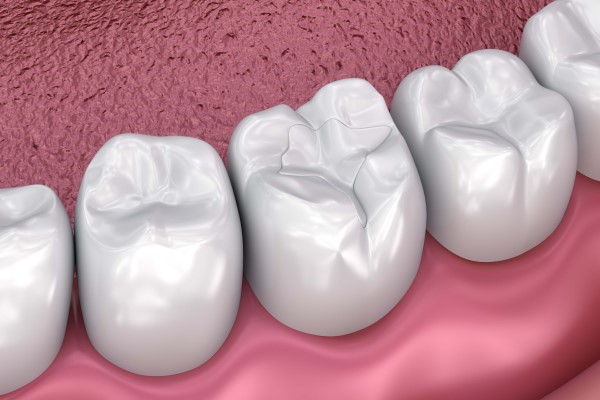When Should You Get Dental Fillings?

When individuals experience cavities and other problems that affect their teeth, dentists use a dental filling to repair and restore them. This helps preserve damaged teeth and prevents their loss. Dental fillings are the most common type of dental work: according to the Centers for Disease Control and Prevention, over 90% of Americans have had at least one cavity. Of that group, 80% have had them treated. Even though it is a routine procedure, it plays an important role in maintaining oral health in both children and adults.
Untreated tooth decay can cause serious problems, even in baby teeth. Not only does it lead to an increase in sensitivity and pain, but it also puts a person more at risk for developing a dental infection. Tooth decay is rarely stagnant but continues to progress with time. In its later stages, it can weaken or damage a tooth so severely that serious treatment or extraction is required. Fortunately, a simple filling in the early stages can save a tooth and prevent more invasive treatment and tooth loss.
There are many materials that can be used to safely and effectively fill a dental cavity. Each has its pros and cons and is worth consideration. Patients who require fillings may want to understand what types are available, how they might affect the teeth, and how long each lasts before a replacement might be necessary.
What are dental fillings?
These fillings help dentists save teeth that might otherwise be lost due to trauma or a deep cavity. For example, a molar chipped by a hard food may be saved by a filling, and a tooth with a painful cavity may not need removal because filling options are available. Fillings may also reduce the risk of infections in and around a cavity by keeping food particles and bacteria out of the damaged area. Patients who require a dental filling might want to ask about the different materials available so they can make the most informed choice possible regarding the repair of their teeth.
Gold
Some people enjoy the look of gold fillings and believe it enhances the appearance of their smile. These fillings can last several decades or more depending on how well their owners care for them with proper brushing and flossing. Compared to other metal filling types, gold may be slightly more costly, but it is also tough enough to withstand tough or sticky foods.
Porcelain
Porcelain fillings are a popular choice for many dental patients, as the color usually matches well with the surrounding teeth, and porcelain lasts up to a decade longer than metal choices. Porcelain fillings are also stain-resistant, which may be a good choice for people who enjoy foods and drinks that may cause staining, such as:
- Tea
- Tomato sauce
- Certain fruits, such as blueberries
Porcelain fillings may not suit all cavity types, especially large cavities, as dentists may have to sacrifice some of the healthy pulp to accommodate the density of the porcelain material.
Composite fillings
Patients who want a completely natural look for a filling might consider composite material. This type of filling is made of a blend of resin, glass, and quartz and closely matches the color of real teeth. It can also prevent further tooth decay but tends to break down more quickly than other filling types, with most lasting seven years to a decade with proper care.
Silver amalgams
Like gold, silver amalgam fillings are tough and can last up to 15 years, even for patients who enjoy meat and other foods that are often tough to chew. This kind of filling is usually comprised of a mix of metals and not pure silver. It often contains zinc, copper, and sometimes tin and mercury. Because this type of dental filling can withstand a considerable bite force, dentists often use it to fill molar cavities.
Conclusion
Choosing the type of filling for a cavity usually depends on what is available and which type a dentist believes will suit the patient. Appearance, longevity, patient sensitivity, and the location of the tooth being treated should all be taken into consideration. Visiting a dental clinic to discuss cavity repair and filling materials can help patients feel less anxious about any dental work needed. In the end, a filling can help make necessary repairs, protect your teeth from further damage, and even improve the look and function of your smile.
Request an appointment here: https://www.palmbeachdentistry.com or call Palm Beach Dentistry at (561) 225-2057 for an appointment in our Delray Beach office.
Check out what others are saying about our dental services on Yelp: Composite Fillings in Delray Beach, FL.
Recent Posts
The lifespan of a dental filling is limited. Due to normal wear and tear, a replacement may be necessary. When a filling deteriorates or comes loose, your tooth loses the protection that it has against injury and decay and will be more vulnerable to dangerous bacteria. To avoid more dental issues in the future, you…
Metal-free fillings have long been the restoration option of choice for front teeth. You have a cavity on one of your back teeth, though, and you want to know if you can still use composite resin to fill it. You prefer this material since it blends with your natural teeth, but you are unsure if…
While exercising can be important for certain aspects of your health, it can actually have a negative influence on your dental health and lead to dental fillings. The more an athlete exercises, the higher the chance for poor dental hygiene. The lifestyle of exercise can have an impact on the enamel of the teeth and…
Dental fillings rarely start with a patient that is looking for their teeth to get a filling, despite the fact that the gold fillings do look very snazzy. The reality is that most patients come in for a regularly scheduled checkup and we find that there are sufficient wear and tear. Thus, the tooth requires…


